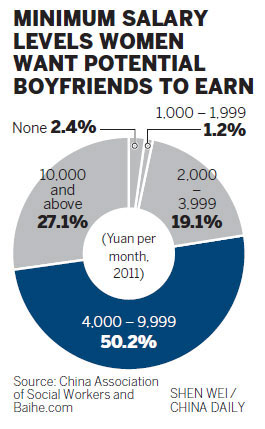Survey discovers women reluctant to date poor men
Updated: 2012-01-06 07:45
By He Dan (China Daily)
|
|||||||||||
BEIJING - The idea that "love is unconditional" was proved wrong in a recent online survey on Chinese attitudes toward love and marriage.
Nearly 80 percent of female respondents said men earning less than 4,000 yuan ($635) a month should not start a relationship. More than a quarter of women polled expected to date men with a monthly income of 10,000 yuan or more.
|
|
Lu Xiongyu, who works at an import-and-export company in Beijing, said it was only fair that women should want to date men earning 4,000 yuan a month or more.
"Living costs are high in big cities and love cannot be sustained without enough bread," the 27-year-old said.
However, not every woman puts the premium on a man's economic status while looking for romance.
"Love is not a trade and a lot of women don't need to economically rely on men for a decent life," said Hu Heng, a 25-year-old resident in Guangzhou, Guangdong province. She is single.
The survey, polling more than 50,000 people nationwide aged from 20 to 60, was jointly conducted by the China Association of Social Workers and Baihe.com, a major dating and matchmaking website in China.
Female respondents regard having a stable income, savings and a house as the most important economic conditions for men they might consider marrying. Less than 6 percent of women said they did not care about the financial status of men.
The survey shows women and men have different reasons for remaining single.
More than half the women polled said they put off marriage for fear that it might fail, as the divorce rate has become high. About 42 percent of women were unwilling to shoulder the responsibility that came with marriage.
Men cited not owning a house and the fear of losing freedom after marriage as top reasons to stay single.
According to a new law, which took effect in August, premarital property is viewed as the personal property of the registered owner, not the married couple's joint estate.
In the light of this new rule, about 40 percent of female respondents said they would require their names to be added to the certificate of real estate property ownership if it were bought by the man before marriage. About 40 percent men surveyed said "No" to this request.
Lu said he would not agree to share the ownership of a property with his girlfriend before marriage.
"What if she does not want to marry me after I write her name on the property ownership certificate?" he asked.
Zhang Jiayang, 23, a resident in Shanghai, told China Daily that his parents bought an apartment for him as he had plans to get married in 2012.
"My fiancee is OK with the fact that the house is legally owned by my parents and I, as we believe that our relationship will not end in a divorce," said Zhang.
Both men and women surveyed agreed that loving each other was the most important factor in a marriage. While men attached more importance to appearance in choosing a spouse, women preferred men who were successful in their careers, according to the survey.
The survey also indicates that the age for first love is getting younger for Chinese. About one-third of the respondents born after 1990 said they fell in love for the first time during primary school or junior high school, which was about 24 percent more than those born 40 years ago.
Sun Xiaomei, a professor specializing in women's studies at China Women's University, believes that the survey can only reflect young urbanites' attitudes toward love and marriage, given the fact that the Internet is not popular among the rural population, especially among those older than 50 in China.
Chen Xin contributed to this story.
Today's Top News
President Xi confident in recovery from quake
H7N9 update: 104 cases, 21 deaths
Telecom workers restore links
Coal mine blast kills 18 in Jilin
Intl scholarship puts China on the map
More bird flu patients discharged
Gold loses sheen, but still a safe bet
US 'turns blind eye to human rights'
Hot Topics
Lunar probe , China growth forecasts, Emission rules get tougher, China seen through 'colored lens', International board,
Editor's Picks

|

|

|

|

|

|






